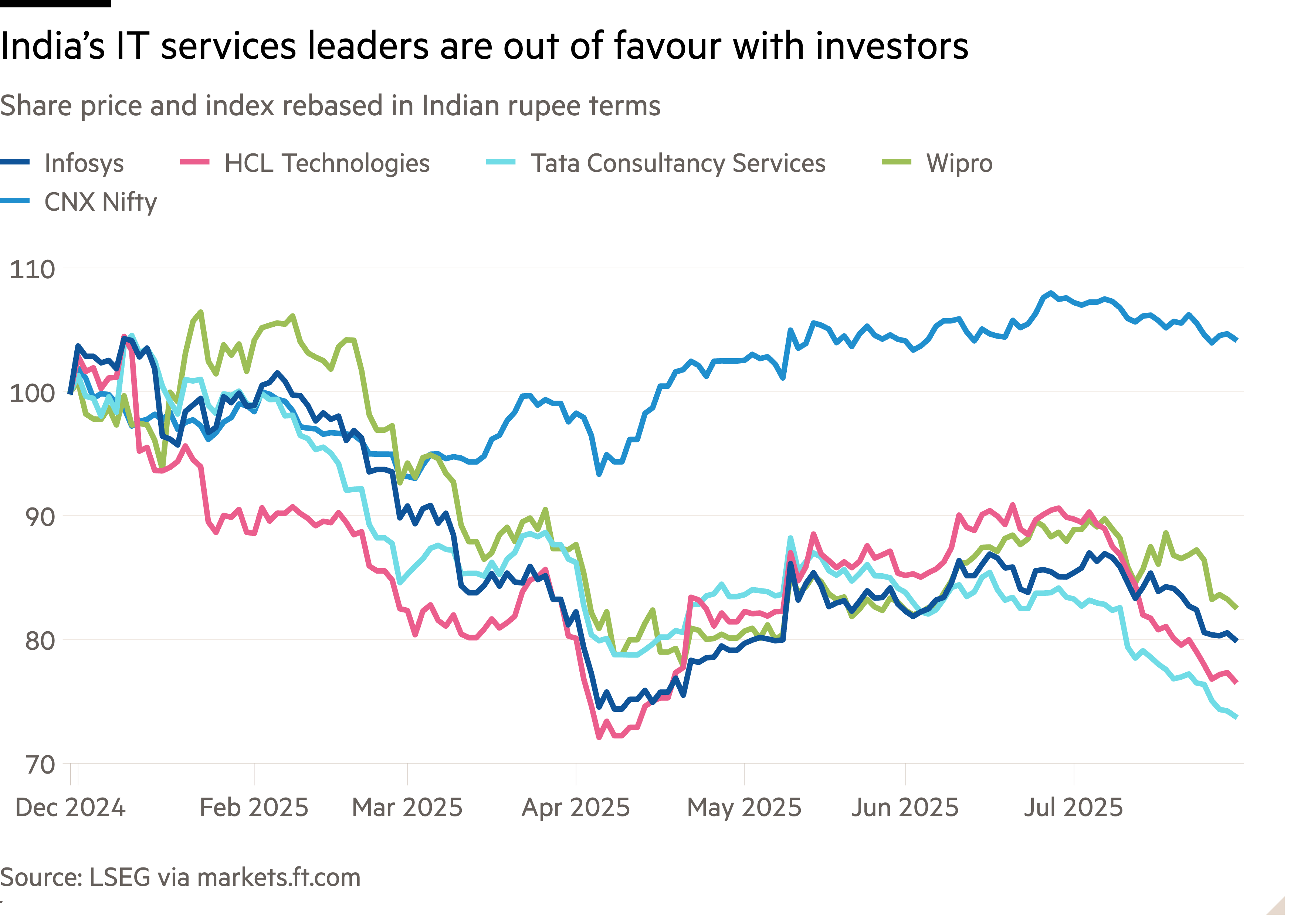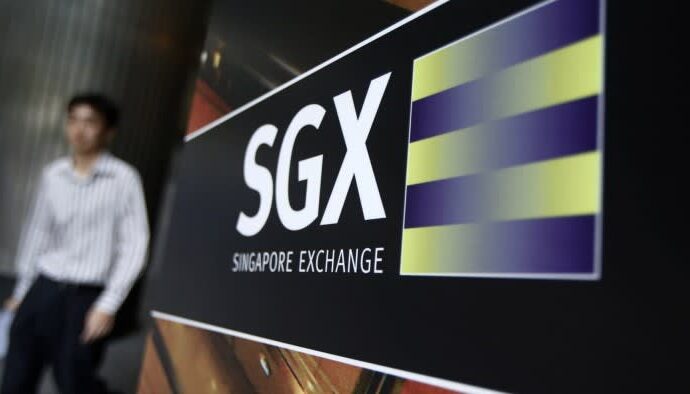India’s IT services giants are racing to reinvent themselves for the age of artificial intelligence, rolling out new tools to customers from banks to sporting bodies even as the technology threatens to slash client spending in the near term.
The country’s vast outsourcing sector has been struggling with tepid customer demand for its services in the US, its largest market, as a “Trump bump” from anticipated tax cuts and easing regulations has failed to materialise. Instead, the US president’s trade battles — including a 50 per cent tariff slapped on India that nevertheless excludes services — have delayed business decision-making and investment.
Sector growth has been in the low single digits for the past two years, according to HSBC, which last month attributed the sluggishness to economic uncertainty, competition from corporate in-house global capability centres being set up rapidly across India, as well as “ambiguity” over the impact of generative AI.
Major players Infosys, Tata Consultancy Services (TCS) and Wipro are keenly aware that AI is a double-edged sword. Nandan Nilekani, Infosys co-founder and chair, told the Financial Times that his company was working on “hundreds” of AI projects with corporate partners, even as “this AI stuff has taken away some of the spending, because everybody is diverting money from other things to AI”.

The tech billionaire said the sector’s niche would be finding practical uses for the “whole cornucopia of technology” developed by a handful of pioneering companies, such as OpenAI and Anthropic, that were “competing to plant their stake in the ground” as Big Tech in the US ploughed hundreds of billions of dollars into AI.
“I think in the next few years, the balance of spending will go from buying core infrastructure to making it useful to companies,” Nilekani said in an interview in Bengaluru. “If you’re helping Fortune 500 companies get their AI going, that requires a different approach — that’s where Infosys comes in.”

Infosys last month said it had built 300 agents, while it recently announced AI implementation deals with German energy provider Eon, Norway’s DNB Bank and the UK’s Lawn Tennis Association. At the same time, chief financial officer Jayesh Sanghrajka told analysts that some “discretionary programmes” had been paused by companies because of “significant investments” in AI.
In TCS’s recent quarterly results, India’s largest IT company reported that consolidated revenue climbed just 1.3 per cent year on year, falling below analysts’ forecasts despite it signing AI deals, such as modernising Virgin Atlantic’s tech operations.
Aarthi Subramanian, the new chief operating officer at TCS, said the Mumbai-based company had seen “strong demand” for AI and analysing data. She noted that TCS had built a product for AmTrust, a New York-based property and casualty insurer, to help brokers generate personalised quotes quickly.

Infosys and Wipro fared better with their earnings reports, which revealed signs of recovery as they secured multibillion-dollar projects and achieved sales growth that exceeded expectations.
HCLTech, the third-largest IT outsourcer in India, reported more mixed results, with revenue expansion exceeding forecasts, but quarterly net profit declining 9.7 per cent from a year ago.
Kumar Rakesh, a Mumbai-based IT analyst at BNP Paribas, said the June quarter was usually good for the sector, as clients released budgets earlier in the year. But more concerning for investors was commentary that demand had “further deteriorated for some of these companies”.
“What that means is that the expectation that things will start improving in the second half may not necessarily materialise,” he said.
While India’s tech industry generated $284bn in annual revenues, some analysts predicted the sector faced inevitable cutbacks, as clients used AI to trim spending.
Aparna Iyer, chief financial officer at Wipro — India’s fourth-largest IT company owned by the billionaire Premji family — said in an interview that AI adoption was still in the “very early” stages, but Wipro’s strategy was “anchored around that”.
India Business Briefing
The Indian professional’s must-read on business and policy in the world’s fastest-growing big economy. Sign up for the newsletter here
“Even as we are forming and rethinking, I think a lot of our clients are pretty much in the same phase,” she added.
The size of India’s AI market is expected to grow from up to $9bn in 2023 to as much as $22bn by 2027, according to estimates published last year in a joint report by Boston Consulting Group and Nasscom, India’s IT industry trade body.
Yet, despite having leading IT companies and one of the world’s largest pools of software engineering talent, India has been a relative latecomer to AI innovation. Prime Minister Narendra Modi’s government only launched its IndiaAI Mission to promote development last year, compared with China issuing an AI plan in 2017. New Delhi has now earmarked about $1.2bn to help increase AI capabilities and infrastructure over five years.
Indian government officials have also privately bemoaned the relatively late start in AI by some of its leading companies.
“Ideally, TCS or Infosys should have invested in models 10 years or five years back,” one official in New Delhi told the FT.
“Almost none of them are looking to use the AI wave as a way to move up the value chain, and build AI [large language models] themselves, or invest heavily in R&D in AI,” said Anirudh Suri, non-resident scholar at the Carnegie India think-tank. “In a way, they’re riding the wave of AI, but not planning heavily for a scenario where the wave actually disrupts them or their business model.”
Cost-cutting and streamlining opportunities presented by AI have also left questions over future hiring in India’s tech industry, one of the few sectors to provide large-scale white collar work to more than 5mn people, in a country that is struggling to find formal employment opportunities for its vast population.
Late last month, TCS said it would cut 2 per cent of its workforce, about 12,000 mainly middle- to senior-level staff, as part of “future-ready” plans to invest in new technology and deploy AI “at scale”.
BNP Paribas’s Rakesh said generative AI tools and automation required fewer people, and for Indian outsourcing, “part of the revenue model is based on per-hour effort basis . . . that is being disrupted”.
“If [AI adoption] leads to productivity and therefore you can do more things with fewer people, that’s the right way,” Nilekani said. “We have seen many iterations and generations of technology in the last 40 years . . . so I think we have a very agile way of retraining our people.”

